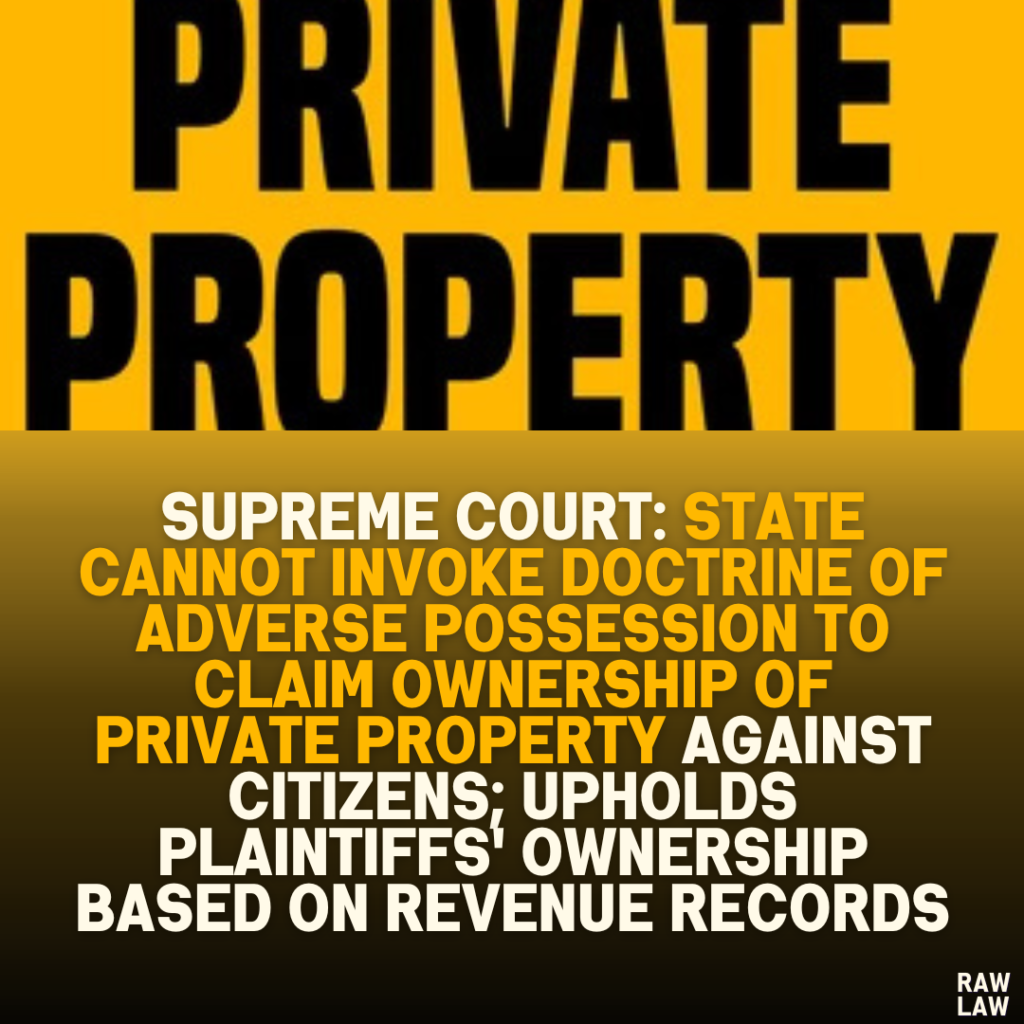Court’s Decision:
The Supreme Court dismissed the appeal by the State of Haryana, affirming the High Court’s decision that the State cannot invoke the doctrine of adverse possession to claim ownership of private property against its own citizens. The court held that the plaintiffs successfully established ownership through revenue records, registered sale deeds, and mutation entries. The court declared the defendants’ possession to be permissive, not adverse, and restored the decree in favor of the plaintiffs.
Facts:
- The dispute centered around a parcel of land measuring 18 Biswas in Bahadurgarh, Haryana, located on both sides of National Highway No. 10. The plaintiffs claimed ownership based on historical revenue records and sale deeds.
- Allegedly, the State and its Public Works Department (PWD) had unauthorizedly occupied the land three and a half years before the plaintiffs filed a suit for possession in 1981.
- The plaintiffs contended that the defendants ignored repeated requests and a legal notice served under Section 80 of the Code of Civil Procedure, 1908, to vacate the property.
- The defendants countered, arguing that they had been in continuous possession of the land since 1879-80. They asserted that their possession was open, hostile, and adverse, thereby perfecting title through adverse possession.
- The Trial Court found in favor of the plaintiffs, holding that the State’s possession was permissive and did not amount to adverse possession. However, the First Appellate Court reversed this finding, declaring the plaintiffs as “land grabbers” who manipulated revenue records. The High Court overturned this decision, restoring the plaintiffs’ ownership, leading to the current appeal.
Issues:
- Can the State claim ownership of private property through adverse possession against its own citizens?
- Was the High Court justified in overturning the First Appellate Court’s decision?
Petitioner’s Arguments (State of Haryana):
- Failure to Prove Title: The plaintiffs relied solely on revenue records without producing sale deeds or other substantive evidence of ownership.
- Adverse Possession: The State claimed it had been in continuous possession since 1879-80, which created a presumption of ownership under Section 110 of the Indian Evidence Act, 1872.
- Burden of Proof: Asserted that the plaintiffs, in a suit for possession, must prove their title independently and cannot rely on weaknesses in the defendants’ case.
- Limitation Period: Argued that the suit was barred under Article 65 of the Limitation Act, 1963, as the plaintiffs failed to challenge the State’s possession within the prescribed period.
- Declaratory Relief Requirement: Claimed the plaintiffs should have sought a declaration of title before filing a possession suit.
Respondent’s Arguments (Plaintiffs):
- Implicit Admission of Title: By pleading adverse possession, the State acknowledged the plaintiffs’ ownership, as it did not explicitly deny their title in court.
- Permissive Possession: Cited historical records indicating that the State’s use of the land was conditional and permissive, not hostile.
- Revenue Records: Presented consistent entries in revenue records, including jamabandis and sale deeds, showing ownership since 1960.
- Burden of Proof: Contended that the defendants bore the burden of proving adverse possession, which requires hostile and uninterrupted possession for the statutory period.
Analysis of the Law:
- Adverse Possession Doctrine:
- For adverse possession to apply, the possession must be continuous, open, peaceful, and hostile to the true owner.
- In Vidya Devi v. State of H.P. (2020), the court held that a welfare state cannot claim adverse possession against its citizens, as it contradicts constitutional principles.
- The State’s possession, described in the Misal Hakiyat of 1879-80, was found to be permissive, not hostile.
- Revenue Records and Ownership:
- Revenue records, although not conclusive evidence of ownership, are admissible under Section 35 of the Indian Evidence Act as public records.
- The plaintiffs produced sale deeds and mutation records substantiating their ownership. These records carried a presumption of correctness.
- Burden of Proof:
- In a possession suit, the plaintiff must establish their title. The plaintiffs met this burden by providing sale deeds, mutations, and revenue entries.
- The State, failing to specifically deny the plaintiffs’ title, had the onus to prove adverse possession, which it failed to discharge.
Precedent Analysis:
- Vidya Devi v. State of H.P. (2020):
- Held that the State cannot dispossess a citizen of their property without following due process.
- Emphasized that adverse possession cannot be invoked to appropriate private property.
- State of Haryana v. Mukesh Kumar (2011):
- Affirmed that the right to property is a human right and adverse possession cannot be used as a tool to acquire property unlawfully.
Court’s Reasoning:
- The State’s plea of adverse possession inherently acknowledged the plaintiffs’ ownership and lacked the essential element of hostility.
- The Trial Court rightly observed that acts like placing bitumen drums or constructing temporary structures did not amount to adverse possession.
- The First Appellate Court erroneously ignored the plaintiffs’ sale deeds and relied on conjecture to label them as “land grabbers.”
- The High Court correctly intervened under Section 100 of the Code of Civil Procedure, as the First Appellate Court’s findings suffered from legal and evidentiary errors.
Conclusion:
The Supreme Court dismissed the appeal, finding that:
- The plaintiffs proved their ownership through documentary evidence.
- The State’s plea of adverse possession was impermissible under the law.
- The High Court’s judgment was legally sound and warranted.
Implications:
- Reaffirmation of Property Rights: The decision underscores that the State cannot exploit adverse possession to claim citizens’ property.
- Protection of Citizens: Strengthens constitutional safeguards against arbitrary state actions, reinforcing trust in the judiciary.
- Clarification on Adverse Possession: Limits the scope of adverse possession claims, especially by government entities, ensuring fairness and adherence to due process.
